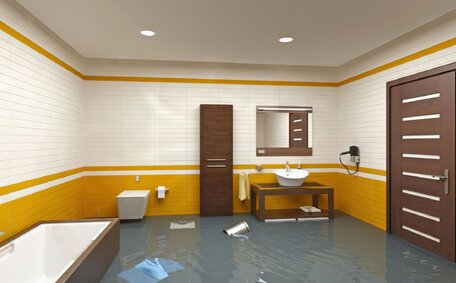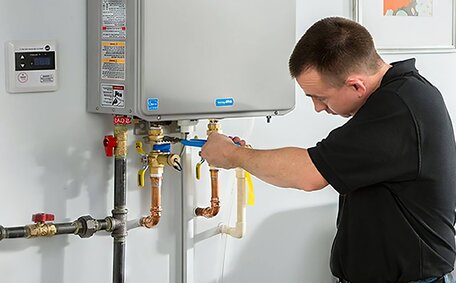
Signs Your Hot Water System Is Failing
Common signs your hot water system is failing include strange noises, rust, leaks, inconsistent temperature and pressure. Call our licensed plumbers if you notice these issues for repairs.
Read MoreAs a landlord, it is your responsibility to ensure all gas installations and appliances are regularly checked by a licensed gas fitter, and any issues found are addressed promptly. Timely rectification ensures the safety of your tenants and the integrity of your property.
In Victoria, the law mandates annual inspections of all gas appliances, installations, and fittings to confirm that systems, both hot and cold, are functioning effectively, including:
A registered licensed gas fitter will conduct comprehensive checks to ensure gas appliances operate safely, minimising risks of gas leaks, blockages, or carbon monoxide poisoning. They will test devices to confirm proper operation and ensure there are no malfunctions.
As a landlord, You are required to keep records of every annual gas safety check, including hot and cold water system inspections, for at least two years. Provide tenants with a record of these inspections before they move in, and update it biennially. Failing to manage repairs responsibly and not providing current gas safety records can result in fines of up to $1,800.
Should any gas appliances or installations be found faulty or damaged during checks, you must quickly arrange for repairs with a licensed gas fitter. Choose a gas fitting provider based not on cost alone but on reputation and experience.
Along with fines for not maintaining proper gas safety records, neglecting to carry out annual checks or execute repairs may result in additional penalties. Rental providers have a legal obligation to meet all compliance requirements, as non-compliance can result in fines exceeding $13,000. More to the point, failure comply with fire safety health standards, which results in gas leaks or faulty appliances, endangers your tenants, leading to grave legal responsibilities.
All aspects of gas safety, including installation, repairs, and servicing, should be completed and certified by a registered engineer to ensure safe operation. Only qualified gas fitters conducting work in the main living area and registered with the Australian Building and Plumbing Authority (ABPA) have the expertise to ensure your gas systems comply with regulations and meet safety standards.
Fulfilling your responsibilities for gas safety checks, record keeping, and repairs ensures the safe use of all appliances for tenant welfare and protects you from significant penalties under the Gas Safety Act.
This should occur:
A licensed specialist conducting electrical gas safety inspections will methodically examine:
Scheduling annual gas appliance safety checks and addressing issues promptly ensures the well-being and comfort of your tenants. While inspection fees average around $150, landlords should consider them a wise investment in mitigating gas-related risks in their properties.
When it comes to maintaining safety, particularly for tasks such as organising gas appliance inspections, servicing, repairs, or installations, selecting a qualified professional licenced by the Australian Building and Plumbing Authority (ABPA) is crucial.
Gas fitters are required to complete thorough training and acquire a license from regulatory bodies to be registered for work. Recognised by Consumer Affairs Victoria, these professionals can issue compliance certificates and certify the operational status of gas and electrical systems, as well as endorse new installations.
Regularly check a gas fitter’s licence on the ABPA register to confirm the validity of their accreditation. This confirms they can legally and safely conduct work. Opting for your local professional from a reputable Sydney company can provide peace of mind, a valued asset over any other selection.
Reaching out to Marrickville’s Plumbing at 1300 349 338 enables you to engage with fully compliant, well-versed gas professionals devoted to ensuring the safety and reliability of your house apartment gas systems.
As a landlord, properly maintaining all gas appliances and fittings is essential for ongoing performance and safety between mandatory annual checks.
Although annual inspections should catch major issues, it is advisable to service and maintain appliances every six months. This allows a gas fitter to thoroughly inspect and service appliances to:
Preventative maintenance can decrease the likelihood of faults arising between annual inspections, extending the lifespan of appliances.
Pipework should be checked at regular intervals to ensure it’s in good working condition and its supports are intact. Well maintained gas systems remain safer and more energy efficient.
As a landlord, you have a legal responsibility set out to maintain thorough records of all gas safety checks, servicing, repairs, and maintenance carried out on rental properties.
Retain detailed gas safety inspection reports for two years to demonstrate that appliances are well maintained. These should be checked to provide a detailed condition report of all gas appliances and installations on the property.
A copy of the most recent safety report must also be provided to tenants at end tenancy, in accordance with the tenancy agreement. Existing tenants have the right to request gas safety documentation at any time, a guarantee provided at the end of their lease.
All repairs or maintenance conducted on gas systems between annual inspections should also be recorded, including:
Maintaining comprehensive gas safety records is evidence of fulfilling transparency and best practice obligations in property management.
As a tenant Tenants are entitled to significant rights concerning the gas appliances supplied in their rental properties. This involves a comprehensive approach, ensuring that any rights and specific requirements of a tenant are accounted for, including:
Your landlord must provide you, the tenant, with more than the records you need, including a copy of the most recent electricity gas safety check carried out on all appliances and installations before you move into the property. This indicates that the property’s gas systems met safety requirements at the last inspection, a crucial aspect of upholding residential tenancy standards.
You also have the right to request an up-to-date gas safety record at any point during your tenancy. Your landlord/agent legally must provide this documentation within 28 days, ensuring your safety requirements are met – it’s what you should know and expect.
If you smell gas, suspect an appliance is leaking or identify any potential faults, what do i do? You should immediately inform your property manager or landlord. They must carried out promptly organise inspection and repairs by a licensed gas fitter.
It’s essential any gas safety hazards are addressed quickly to avoid risks like gas leaks, explosions or carbon monoxide poisoning.
If a serious gas safety issue is reported but your landlord fails to carry out repairs in reasonable time, you may legally be able to withhold rent. For more information, understand that formal procedures as specified under section 123 of the Residential Tenancies Act must be followed, which can also offer a legal framework.
You should first formally request repairs again in writing. If still not addressed within 14 days, contact New South Wales Fair Trading to file an official complaint and receive guidance on rent payment rights.
This may include:
This includes:
If gas safety issues like leaks result in harm, injury or loss for your tenant, you may be sued and held liable. This can involve heavy compensation payouts.
Tenants can legally withhold rent if you fail to repair serious faults. You may also struggle to find new tenants if gas appliances are not maintained to expected standards.
Avoiding negligence when managing gas safety helps mitigate risks for both landlords and tenants.
If you smell gas or suspect a leak, evacuating everyone from the property is what you’ll need to immediately prioritise. Do not turn any electrical switches or appliances on or off, as sparks could ignite leaking gas.
From outside, call 000 and report the emergency to fire brigade and emergency services, which is exactly what comes next. Advise them that you have a suspected gas leak. They will attend and evaluate the situation, offering you the peace of mind you need about when it’s safe to re-enter the property.
If there’s no immediate risk and a safety check should be done for you to re-enter the property quickly, turn off the gas supply at the main isolation valve next to the gas metre. Do not turn the gas back on until the leak is repaired and declared safe.
This requires an anti-clockwise quarter turn. This cuts out gas flow into the pipes when it comes to emergency shutoffs.
Stay clear of the property even after shutting off the gas supply until emergency services have evaluated the scene and confirmed it’s safe, which is what you’ll need to adhere to. Dangerous gas levels may still be present and you must avoid sources of ignition.
Once emergency services allow safe re-entry, and when comes the time to repair, contact a licensed gas fitter like Marrickville Plumbing on 1300 349 338 to locate and repair the leak. Never use DIY gas repairs. All defective gas fittings must be replaced and the system declared safe before resuming the gas supply.
Carbon monoxide (CO) is an odourless, colourless toxic gas that can be fatal if inhaled, hence carbon monoxide testing detectors should be installed. Open flued gas appliances like heaters should be carefully monitored as they can leak CO if faulty or poorly maintained, with initial symptoms of poisoning resembling flu.
Installation of CO detectors, which vary by region, is generally mandatory near natural gas appliances and living spaces. For rental properties in NSW, gasfitting work operating under creative commons attribution 40 international standards necessitates detectors to be positioned:
Optimal locations are on the ceiling or high up on walls, as an appliance containing gas can only function safely with proper ventilation according to residential tenancies regulations. Units should be replaced every 5-7 years as sensors degrade over time.
Look for detectors certified to Australian Standard AS/NZS 4645 to ensure safety and keep your gas appliances secure. Ensure the unit detects carbon monoxide specifically, not just smoke or gases in the appliance installation. Battery operated models offer simpler installation, while hardwired interlinked types provide whole home coverage.
Contacting reputable gas fitting professionals like Marrickville Plumbing assists with ensuring your property is equipped with properly selected, supplied, positioned, and installed detectors tailored to your rental property’s layout and gas appliance types.
Common signs your hot water system is failing include strange noises, rust, leaks, inconsistent temperature and pressure. Call our licensed plumbers if you notice these issues for repairs.
Read MorePipe relining is an eco-friendly alternative to pipe replacement that uses materials like epoxy resin to repair pipes without digging. It produces less waste and emissions than traditional methods. Learn about the environmental benefits of trenchless pipe relining.
Read MoreReplacing an outdated electric, gas or solar hot water system with a more efficient heat pump or solar model can significantly reduce your energy bills and carbon footprint. Take advantage of available rebates. Contact us to retrofit your old system today.
Read MoreMarrickville, 2204 NSW
We will call back as soon as possible.




